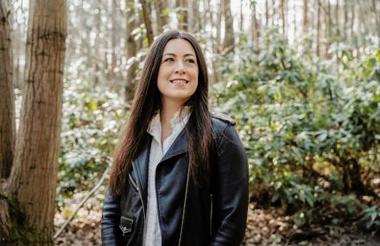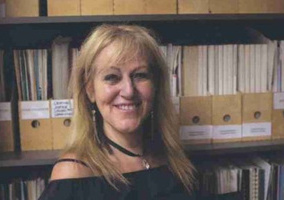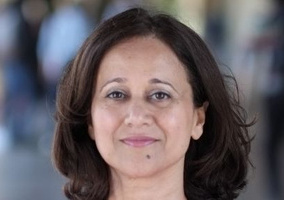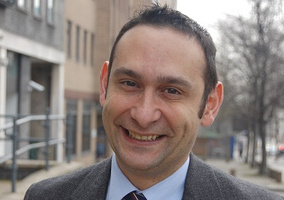As an ex-management consultant, Emma de Closset thinks in threes. So, when she joined the UK Community Foundations (UKCF) as its chief executive in January this year, she set a trio of goals for herself.
de Closset wants to be an ambassador for UKCF worldwide. Whether it is in Canada, Australia, India or South Africa, community foundations are the best-kept secret of a country, but that should not be the case, she says.
So, she is striving to change that by ensuring people know about the role community foundations play both in their local area and collectively as a network.
UKCF is a national membership organisation with 47 accredited community foundations spread across the UK. It has a collective presence in every postcode. And de Closset wants to visit them all.
“I want to visit all of our community foundations because the beating heart of what we do is place-based,” she said. “So, it’s very, very important to me that I don’t just do my job from London, that I go out and visit projects first hand and get to know the people. It’s a relationship-based world.”
So far, she has visited community foundations in Yorkshire, Cornwall, Devon, Dorset, Kent, London, Durham and Tyne and Wear among others. She plans to split her visit to the rest of the community foundations between online and in-person meetings, with the hope that she will have visited all of them by the end of the year.
“I’ve had conversations with lots of them individually and still have quite a few to get through, but I have gathered so much intel from those conversations,” she says.
She is also starting to engage with partners including the government, funders and businesses to ensure she understands their perspectives working with UKCF and identify where opportunities lie in the future.
Her third goal is to celebrate the 50th anniversary of the establishment of the first community foundation in the UK.
While the first community foundation was set up in the US in 1914, the UK had to wait until one in Swindon, founded in 1975. It later merged with the Wiltshire Community Trust to form the present Wiltshire Community Foundation.
Many other community foundations were formed during the 1980s and in 1991 the Community Foundation Network was established to invite cooperation and share best practice.
In 2013, the Community Foundation Network relaunched as UKCF. The 47 community foundations in the UKCF network collectively manage £811m in purposeful endowments and distribute over 40,000 grants each year, over £170m, to support local communities.
As part of the celebrations later this year, de Closset is working on a couple of special events that not just showcase the impact that community foundations have had nationally, but also their place on the international stage.
“I can’t say too much about that just yet,” she says. “We’ve got 50 years’ worth of impact to celebrate and shout about, and that’s going to be a big priority for me this year.”
Bridging national and local knowledge
As its new chief executive, de Closset says UKCF will take a fresh look at its income generation strategy that includes new partnerships, dormant assets and membership fees, which will be a big part of the charity’s income moving forward.
UKCF has been recording deficits for the past four out of five years, according to its accounts.
Figures for the financial year ending March 2024 show that the charity’s unrestricted programme income will “likely fall” as a key national programme with the Department for Culture, Media and Sport (DCMS) comes to an end in March 2025.
The accounts add that there is the potential need to reduce unrestricted expenditure to a more sustainable level.
With the spring budget coming up, de Closset says UKCF is hoping to see a focus on prevention and measures that will encourage philanthropy, particularly regional philanthropic giving.
But as a former civil servant, she admits: “My sense of this is always that they are agreed well before they are published. So, from the time that I’ve arrived at UKCF, that would be a little bit late to be influencing the spring budget.”
As a civil servant at Downing Street from 2010 to 2012, de Closset worked with the prime minister and deputy prime minister's advisors to ensure the coalition's programme for government was understood by government departments, including the Foreign Office, DCMS and former Department of Energy and Climate Change.
And as a senior civil servant at the Cabinet Office from 2018 until joining UKCF, she was involved in multiple special projects, including a secondment to the Department for Science, Innovation and Technology in 2023 when she was the prime minister’s deputy representative for the AI Safety Summit and chief operating officer for the G7 Presidency in 2021, one of the first in-person gathering of world leaders since the start of Covid-19.
Having spent years working in Whitehall, de Closset wanted to get closer to the communities she was helping, so when she came across the chief executive role at UKCF, she could not pass it up.
“As someone that has worked in central government for such a long time, the opportunity to go and work for an organisation that can bridge national endeavours with hyper-local knowledge, relationships and expertise was just hugely exciting,” she says. “That's the holy grail of policy making.”
With the relatively new Labour government in charge, de Closset thinks that it is encouraging to see its approach to partnership with the charity sector.
She says: “One way to interpret mission-driven government is that it’s not just about the delivery of five specific missions.
“It’s also an ethos and a mindset about how change happens and a recognition that central government is not always best placed to make change or can’t do it alone and needs to do it with others.
“So, the recognition that government needs to be working in meaningful partnership with civil society is hugely encouraging, and the government’s thinking about its role in bringing together civil society with local government and businesses to collectively look at systemic issues and how to be more than the sum of their parts by tackling them together is also really encouraging.”
UKCF has been working with DCMS to have some input on the Civil Society Covenant, she says.
“It feels to me like a more collaborative, collegiate approach than we have perhaps seen in recent years, and that is an exciting time to step into an organisation like UKCF,” she says.
Making an impact
A common thread in de Closset’s career is the ability to make a difference.
Whether it is in the public service or voluntary sector, her motivators are to help people and make sure that she is doing something that leads people to be supported in where they live.
“That’s just a huge part of my personal ethos,” she says.
People should have agency, purpose and connection, she says, and UKCF brings that together and enables it across the areas that we support.
“So, for me to play even a small part in making that happen is hugely rewarding and exciting,” she says.
One of the things that drove her towards her role was when she was the prime minister’s deputy representative at the AI safety summit in 2023.
She thought about the changes AI is going to bring in the next few years, the technologies that will replace people’s daily tasks and what makes life worth living.
She says: “The answer is very much grounded in the communities where we live, the relationships people have with those around them and the care people provide across generations.
“That UKCF is able to take on a role that strengthens the bonds between people and helps keep the fabric of society together and as strong as it can before a period of disruption felt like an incredibly powerful prospect.”
When asked about her experience at UKCF so far, de Closset says she is measuring it like babies.
“I've got three children and when your babies are born, you measure it in days and weeks, and then you graduate to months and years. Your knowledge just grows exponentially as you move along that curve and it feels like that.
“This is still very early days with UKCF, but I feel that it will probably be the best job I’ve ever had, and I have fallen in love with it already.
“There’s still a lot to learn and figure out, but I’ve been just hugely excited about what I’ve seen so far. It has been such a whirlwind but the most enjoyable kind.”
Related articles












